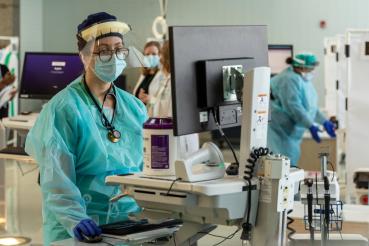As COVID-19 surges across the U.S., even some of the most cautious among us could catch the virus.
But don’t be too hard on yourself if — despite your best efforts — you’re one of them, says Rush rehabilitation psychologist Abigail Hardin, PhD.
“Although these feelings are natural, they’re completely unwarranted,” she says. “It’s easy to think, ‘Gosh, I wish I just would've been more careful,’ but give yourself a little bit of grace. Account for the fact that the virus and guidance continues to change, and we have more information today than we did even a week ago.”
For one thing, the omicron and delta variants are reportedly easier to transmit. And even being vaccinated and boosted may not offer full protection — although it dramatically reduces your chance of infection and, worse, severe illness and hospitalization.
Hardin encourages people to think proactively about the possibility of testing positive — just in case.
“It’s important to have an emotional plan, such as coming up with one to three compassion statements that you can tell yourself if you test positive,” she says. “This is more productive than beating yourself up or trying to turn back the clock.”
Hardin shares a few compassion statements to keep in mind for if you test positive for COVID-19:
- “I did the absolute best that I could with the information that I had at the time”
- “I was trying to protect my family and was being reasonable about what my family's social and emotional needs were for the week”
- “The fact that I tested positive is unfortunate but I did the best I could and now it's time to take care of myself”
The virus’ effect on the mind and body
At the beginning of the pandemic, the message from authorities was to prioritize our physical health over mental health to help flatten the curve of COVID-19 cases, Hardin says. And many of us expected it to be temporary, but that is no longer the case.
“The communication now, especially with the omicron variant, is to still do your best to flatten the curve, but realistically this is not something that we can get out of anytime soon,” she adds. “It’s very easy for us to tolerate a short challenge, such as sitting in traffic or meeting a deadline, but what we’re faced with now is an ever-extending continuation of trauma, and that can feel very demoralizing.”
Research shows that people are now reporting symptoms of anxiety or depression increased from nearly 11% in 2019 to about 30%, and these numbers continue to rise.
“If people haven’t already had some symptoms of depression, I would expect they will happen very soon,” Hardin says. “Otherwise, there’s a risk of completely shutting down because they simply don't have the cognitive reserve to do it any longer.”
She adds that when we are under mental stress, this can activate hormones that cause physiological changes, such as to your immune health, blood pressure, heart, risk for chronic disease, etc.
“It’s important to recognize how you’re feeling and your symptoms, and seek the proper medical attention as needed,” Hardin adds.
Coping with COVID-19, two years in
Each of us has a different way of coping with stress, as we’ve seen with a variety of approaches to dealing with the pandemic — whether you take safety precautions, live your normal life or are somewhere in the middle.
Regardless the approach, the virus — and its emerging variants — has taken an unavoidable toll on our psyches and how we deal with stress.
“The word that comes to mind when I think about what everyone has universally lived through is trauma,” Hardin says. “And even though we are living through it, it doesn’t mean we necessarily realize how much it's truly affecting all of us.”
Hardin shares a few tips to keep in mind as we continue to cope with COVID-19 and its effects:
- Get good sleep
- Exercise regularly
- Eat a balanced diet
- Don’t rely too heavily on alcohol
- Connect with your support system
- Seek counseling services, if needed
If you are noticing that you’re not feeling like your normal self emotionally or you feel that you’re withdrawing, talk to your provider or consider entering counseling.




